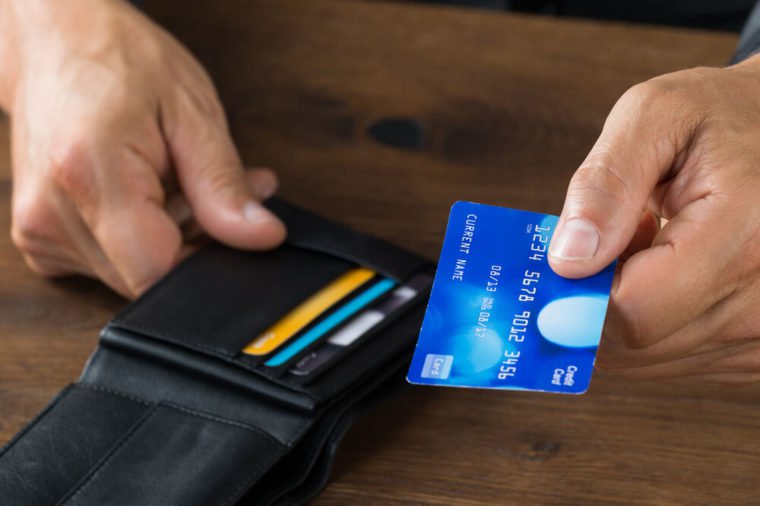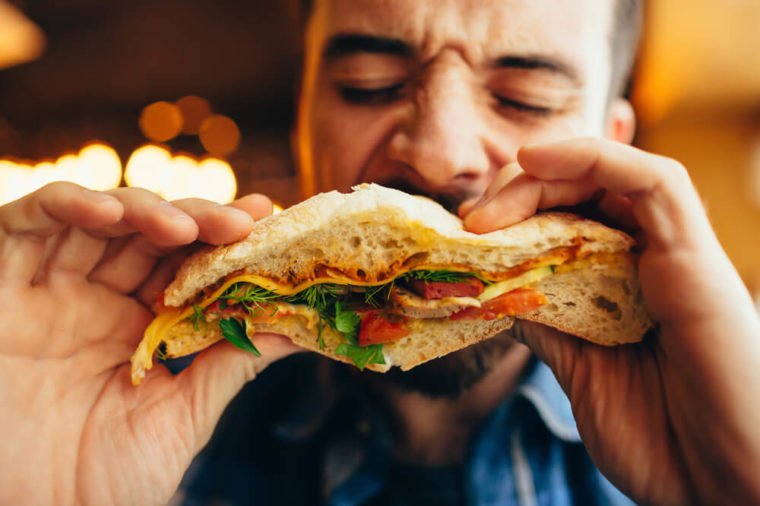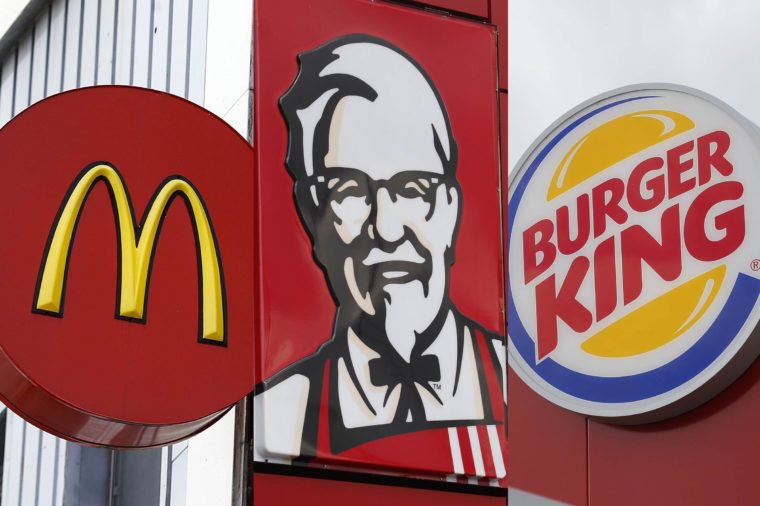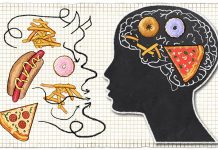You probably know it can blow up your waistline, but fast food may also have a surprising impact on your mood and mind.
You feel more impatient

In a series of different experiments, Canadian researchers found that merely thinking about fast food can prime people to feel hurried. In another experiment, people who subconsciously viewed fast food logos and then read certain passages rushed through them more quickly than people who weren’t exposed to the logos. “The way people eat has far-reaching—and often unconscious—influences on behavior and choices unrelated to eating,” the study authors noted. This is what fast food does to your immune system.
You splurge more

Fast food may make us more likely to splurge, even when we’re no longer in the restaurant. “We associate fast food with speed and instant gratification,” says Sanford DeVoe, an associate professor at the University of Toronto’s Rotman School of Management, whose research found that households in neighborhoods with more fast food restaurants have lower levels of savings (even after accounting for variables like income, education, or ethnicity) than those with fewer fast food outlets. “When we see fast food logos or recall a recent experience eating at a fast food restaurant, we are put into a mental state of impatience that may make us more likely to spend on an immediate reward than save for something down the road,” says DeVoe.
You may be prone to depression

People who eat a lot of fast food are 51 percent more likely to be depressed than those who steer clear of it, according to a Spanish study. The more burgers, pizza, and fries people ate, the greater their risk. More research is needed to see whether a fast food diet causes depression, or whether people with depression are simply more likely to dine on fast food. “Higher intake of fast food may very well increase risks of depression by causing poor health in general,” said David Katz, MD, director of Yale University’s Prevention Research Center in New Haven, Connecticut, told ABC News. “But depression may also increase fast food intake. We use the words ‘comfort food’ for a reason.” Learn what foods are the absolute worst for your brain.
You eat too fast, and too much

It’s not the food that makes you eat quickly, research shows; it’s the overall atmosphere when you eat out. Fast food restaurants are designed with speed eating in mind—and studies show the quicker you eat, the more calories you consume. Bright colors, like yellow and red, are mentally stimulating. Harsh lighting and loud music can also make you race through your meal. In fact, when Cornell researchers gave a Hardee’s restaurant a fine-dining makeover with additions like soft lighting and jazz ballads, people ate almost 200 fewer calories and said they enjoyed their meals more than those who ate in the usual setting. Here’s the truth about what eating too fast does to your body.
Your brain gets hooked on sugar

People think fast food is high in calories and fat, but many of us also don’t realize how high in sugar certain fast food meals can be. In fact, it’s often the foods that sound “healthy” that pack the most sweet stuff. For example, a Wendy’s Apple Pecan Chicken Salad contains 40 grams of sugar; a McDonald’s Fruit & Yogurt Parfait has 22 grams. (Public health organizations recommend consuming no more than 24 grams of added sugar per day.) Recent research has indicated high sugar intake can lead to myriad health issues from heart disease to diabetes to obesity. Brain scans also reveal how sugar can be addictive: the more you eat, the more you’re likely to keep craving it. Learn which foods actually boost your brain health.
You may be more vulnerable to media messages

According to a report by the Yale Rudd Center for Food Policy & Obesity, fast food brands spent $4.6 billion on advertising. Kids under age 6 viewed nearly three fast food ads daily on average, and teens between 12 and 17 saw nearly five. According to Jennifer L. Harris, PhD, director of marketing initiatives at Yale’s Rudd Center, in a PsychologyToday.com blog, adolescent brains are particularly susceptible to food advertising messages. Brain scans show that the reward centers of teen minds have a greater response to food advertisements and food logos, including fast food, compared with other types of ads, she wrote. What’s more, she continued, “due to heightened reward sensitivity, adolescents are not biologically equipped to forgo these tempting offers in the short-term for greater rewards in the future (such as good health).” See how your favorite fast food chains scored in this Center for Food Safety health rating.
You become more anxious

In addition to depression, excessive fast food consumption is linked to anxiety symptoms. The refined carbohydrates in many fast food items can cause your blood sugar to fluctuate. Extremely low blood sugar can cause panic attacks, insomnia, and other anxiety symptoms. In addition, the lack of omega-3 fatty acids in fried food can cause your brain to mimic anxiety symptoms. These are the best (and worst) foods to eat for calming anxiety.
You can become hyperactive

Eating lots of fast food, or junk food of any kind, can give you the jitters. The connection has to do with artificial colors and preservatives, sodium benzoate in particular. A study in Clinical Pediatrics revealed that artificial colors and preservatives can create a jittery, hyperactive sensation in the brain that you’ve probably heard of: “sugar rush.” But it’s less tied to sugar than to these artificial ingredients. Sodium benzoate can be found in products like diet soda, fruit juices, and condiments.
Your risk of dementia can increase

Eating lots of fatty fast food can increase the amount of insulin produced by your pancreas. While you probably already know that increased insulin production can lead to type 2 diabetes, you may not know that there’s a scary link to dementia as well. If the brain develops an insulin resistance, its ability to create and store memories could suffer, increasing dementia risk. Researchers at Brown have even called Alzheimer’s “the diabetes of the brain.”
Your learning capabilities may decrease

A study at RMIT University in Australia found that people who consumed lots of fast food performed more poorly on simple memory exercises. Researchers found that fast food and other types of junk food can reduce neuroplasticity, the process that allows our brains to store our experiences as memories. Learn about the scary effects fast food can have on the teen brain.
Your mood could go from bad to worse

While we may be tempted to reach for fatty, greasy foods when we’re feeling down, researchers have revealed that can actually backfire. Researchers at Penn State assessed how “disordered” eating habits, including eating fast food, affects mood. While there was no improvement or deterioration in positive moods, participants who already felt down in the dumps reported feeling worse after eating unhealthily. “Comfort food” may not be so comforting after all.
You may have a harder time controlling your appetite

Fast food is addictive, and that’s no accident. The trans fats in many fried foods can hinder your brain’s ability to discern how much you’ve eaten and how hungry you are. So you buy—and eat—more. Fast food can even trigger the pleasure centers of the brain to release dopamine, the same chemical that fuels addictions. In extreme cases, a serious fast food addiction can develop. In a similar way to drug addiction, our brains require more and more junk food to satisfy the craving. Even after learning all this, though, giving up junk food is easier said than done. However, there are plenty of ways to train your brain to stop craving the unhealthy stuff.
Source: RD



















































